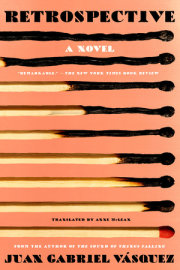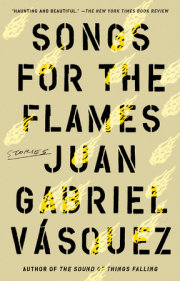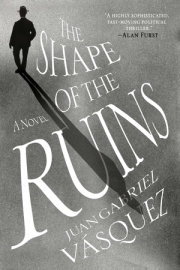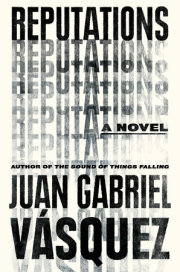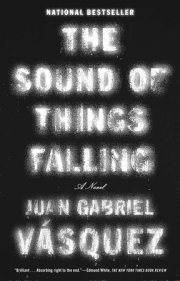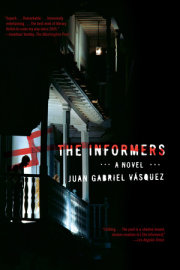Hiding Places
I DIDN’T LEAVE BELGIUM much during that season. I spent the time observing the people of the Ardennes and participating in their activities, and then learning to write what I’d seen in such a way that as little of it as possible would be squandered. In February, a Colombian magazine commissioned me to write an article about a certain Parisian bookshop. French trains went directly to Paris from Liège, but they’d gone on strike two weeks earlier and there was no resolution in sight. So I had to take an old orange train from Aywaille station—a switch in every second car allowed passengers to control the heating—a green one from Liège, and spend the night in the house of a couple of friends in Brussels, in order to catch the first direct train to Paris the next morning. I arrived at the bookshop, stayed there for several days lending a hand as an occasional assistant, and wrote my article. But what happened during the night I spent in Brussels will haunt me forever.
Philippe came to pick me up at the main station, the most inhospitable of the three possible terminals for Liège trains. He was wearing a plaid beret and thick-framed glasses, which he took off to hug me, and on both sides of his nose were red marks from the weight of them. Philippe and Claire had been married the summer before; he was then (at the time of my ill-timed visit) an out-of-work actor. According to what Claire had told me over the phone, he was going through a rough patch: a good contract for a French film had just been canceled due to lack of funding; his first wife was threatening to sue if he didn’t hand over half the value of the house in Zaventem, where they’d lived before separating. I didn’t talk to him about any of this, because we didn’t have that kind of rapport, but in his face—on certain occasions when I asked a polite question, in the grimace with which he waited for a light to change—I could read his preoccupation. We parked right in front of 287 Rue du Noyer; we smelled freshly baked bread as we got out of the car, and this odd fact (it was four in the afternoon) gave us something to talk about during the following uncomfortable minutes. They were uncomfortable because Claire wasn’t there: she spent the afternoons in her studio and she had asked me to meet her after seven, to see her latest works and have dinner with her and the people with whom she shared the workshop. They were uncomfortable also because of the incident with the flowers, which in another place, in other circumstances or backed by a different past, might have struck me as slightly odd or banal. On the rough wooden table that served as both dining table and ironing board there was an arrangement of Spanish azaleas with a single sunflower. There was also a typed card: it was the color of raw meat, and around the border were blue watercolor marks. BEST WISHES, it said on the embossed cardboard.
“My father-in-law,” said Philippe.
He said beau-père, pronouncing the consonants loudly, and smiled with the kind of sarcasm I hadn’t thought him capable of. Then he didn’t say anything else. The house was tall and narrow (four stories, but each floor was barely four meters wide); Philippe excused himself and began to climb the creaking stairs, one after the other, as if he needed all his patience to get up to the master bedroom on the third floor, above the study where the only phone in the house was, beneath the guest room where I would be spending the night.
—
THE PREVIOUS AFTERNOON, Philippe’s father-in-law, Claire’s father, the owner of the house in the Ardennes where I was living temporarily, had come looking for me to take advantage of an unusual circumstance: a late-winter day when the sun was shining.
“The lake is waiting for us,” he said. “Hurry, there’s not much light left.”
Monsieur Gibert did not wait for my answer. He turned around and the sleeve of his jacket snagged on the angular doorknob. A couple of minutes later, I heard the engine of his four-by-four start up.
The lake was an artificial pond that Monsieur Gibert had built to irrigate a cabbage crop, but the crop failed before it got started, and now the only purpose the lake served was for the occasional distraction of a stubborn retired farmer who stocked it with his own trout, which he later fished. Monsieur Gibert carried a Sander rod in his gloved hand and I followed him, eyes fixed on the green water, on the marshy shore, on the heads of the frogs that shone like floating coins and escaped with small commotions when they saw us coming. I sat down on a beech log. Monsieur Gibert put on his bifocals and moved his skilled fingers over the end of the line and over the three sharp hooks of the lure, silver-plated and hard and shiny in the long rays of the afternoon sun. His left hand closed around the cork handle and his index finger held the line against the rod. He drew his arms to one side, and the momentum of the rod cut through the air and the reel sounded like a child sighing as it spun, and ten meters from the shore the lure broke the surface, with delicacy, as if worried about waking a sleeping frog.
“I want you to keep your eyes open,” he said.
“They’re open, monsieur.”
“At their house,” he said. “I want you to notice everything, and then tell me. How they live. If she’s all right, if he treats her as she deserves to be treated.”
All this he said to me as his right hand turned the handle, reeling the line back in. We weren’t looking at each other: we both had our eyes fixed on the sinker and lure sailing toward us like a bullet in slow motion, causing a fragile wake on the surface and emerging upon arrival at the shore. Monsieur Gibert had never been to his daughter’s house. They’d invited him once, and he’d come up with some unimaginative and rather banal excuse. I knew this because Claire told me, imitating her father’s nasal voice, his falsely solemn gestures. Gibert had never made this impression on me; Claire’s complaints made me feel uncomfortable, because I feared her resentments might be contagious. For Claire, everything that happened in her life was the result of what her father had ruined, wasted, or frittered away (emotions, not money).
Gibert stripped tangled plants off the lure. The weeds stuck to the hairs on the back of his hand. He cast again.
“I’m going to tell you something sad,” he said. “Philippe’s not good for my daughter. I mean, he’s a good man, but he has problems.”
“But they’re not definitive, monsieur. He’ll find work.”
“Work?”
“He’s got a job offer in Montpellier,” I lied. “For the summer. They’ll pay well, it’s street theater.”
“His father’s a drunk,” he said. “His sister’s husband beats her up all the time.”
He reeled in his lure. He took off two or three little green branches, which looked like asparagus. He cast again.
“His sister, I mean, not Claire. His sister’s husband beats his wife.”
“Yes, monsieur. I knew what you meant.”
“And him, with his first wife, all that . . . Anyway, it’s all a big mess. That’s what I mean. A chaotic mess.”
Then, as he reeled in the lure, the line hardened like a glass tube. “Ah,” said Gibert. His hand wound the reel, and two steps away from us a brownish-gray trout appeared, thrashing in the water. Gibert lifted the line, the trout changed color in midair and fell onto the grass on the shore, and the pink flecks on its side looked brighter.
“Here, hold this.” Gibert passed me the rod without taking his eyes off the fish. “We’ll throw this one back, it’s just little.”
He began to try to free it from the lure, but the hooks had pierced its cheek and impaled its brown tongue. The blood spread over the silver-plated lure and Gibert’s pale fingers. The trout shook, fell to the ground, Gibert squeezed it in his hands again to try to free it, and said keep still, connasse, I’m trying to help you. The tongue was bleeding, the lure was stuck in it like an anchor, and I was imagining the intensity of the pain and the miracle of features—eyes, a mouth—in which pain is invisible. I don’t usually fish, and maybe that’s why I found myself imagining that a knife was going through my tongue, and I would have sworn I felt a surge of pain in my jaw. Little idiot, said Gibert. His thumbnail turned a watery red.
“Trop tard,” said Gibert. “Too late, filthy creature.”
He walked over to the beech logs with the fish still bending in his closed fist, gasping laboriously like an asthmatic. Then Gibert raised his arm and banged down hard against the edge of a stump, and the trout’s skull made a flat sound as it hit the bark. Gibert hit it three times, very quickly, and the unechoed crunch of broken bones was clear in the air. The bark of the stump was smeared with scales and blood. The trout, one eye burst and covered in splinters, stopped thrashing.
—
I SPENT THE AFTERNOON in the Waterstones bookshop near the Bourse, across the street from a peep show. I found a couple of books about the Paris bookshop I was going to visit. They mentioned George Whitman, the owner, and one of them mistakenly said this was the bookshop that had published Ulysses in 1922. The other, more useful, said that Whitman (who was not related to the poet, it emphasized) had arrived from California and founded three bookshops before the one that I would visit. It was a small book, almost a pamphlet; I thought I’d read it in the hour and a quarter the train journey from Brussels to Paris took. Then I looked at my watch, left in a hurry, and walked as quickly as the cold, biting February air would let me.
Claire’s studio was on Rue Braemt, a street of immigrants in which every second or third building had a Turkish restaurant or a secondhand clothing shop on the ground floor. It was already dark, and only the polished gleam of the neon lights from the shops lit up the quiet street. As I turned the corner, I saw a silhouette in front of the workshop. I had to get very close, almost right in front of her, before recognizing an impatient Claire, who was waiting for me. Or maybe, I thought, it wasn’t me she was waiting for.
Her hair was stuck to her temples, as if she’d been sweating. She told me she’d just had a call from Philippe, and after hanging up the phone, she’d cupped her hands under the tap at the workshop sink and splashed her face, as if trying to wake up.
“It’s his nephew,” she said. “He’s been in an accident.”
Philippe had only one nephew: his sister’s son was an eight-year-old with green eyes who looked nothing like her, but a lot like his father. The only time I met him he confessed that he hated the Flemish language and was never going to learn it.
“What happened?” I asked. “Is it serious?”
“We don’t know anything. Go on up, wait for me upstairs. He’s on his way here, and I don’t think he’d like you to see him right now.”
A little kid in baggy trousers went past on a skateboard. Claire didn’t even notice him.
“This can’t be happening to him,” she said. “Not him, not now.”
“But Philippe’s coming here?”
“Yeah. He won’t want you to see him in such a state. Go on up, go, I’ll be there in a bit. Poor thing, he’s a rotten mess.”
The door to her studio was ajar, as she’d obviously rushed out. I thought I caught a whiff of bad eggs, but it might also have been an oil fixative I wasn’t familiar with. I thought about the smell and about the word Claire had used, rotten, a word barely applicable to a living man. Four neon tubes hung from the high ceiling. On top of a little electric stove, the food Claire was preparing still steamed: stuffed peppers. I took off the lid and the fragrance of the spices mingled with the chemical smell of the fixative and paints. While I waited for Claire, I thought, I could have a look at her canvases. Then I thought she would like to guide me through the paintings when I saw them for the first time, and looking at them without her would be a minor betrayal; so I stretched out on a camp bed covered in wool blankets and picked up a Giacometti book. I couldn’t concentrate (part of my attention was trying to hear any sound coming from the street or the ground floor, a crying man, a consoling woman), but I found an old catalog between the pages: in it, Giacometti was asked why the feet of his figures were so big, and he said: I’ve always had the impression or sense of the fragility of living beings, as if each moment required an arduous energy to remain upright. The words struck me as opportunistic and emphatic, an artist’s pose. I was involved in these ridiculous imaginings when Claire arrived.
“They don’t know anything. And he’s very confused. The boy was out for a drive with a couple of friends and the father of one of them. Nothing happened to any of them. Just him.”
“But what happened?” I asked.
“They were on the highway. Or not, maybe that’s what Philippe thinks. But maybe they were on a mountain road. Why him?”
“Who?”
She looked up and the neon was like powder on her nose. “What do you mean, who?” she whispered, and I realized we were on the brink of a serious misunderstanding. I wanted to say there was an injured child and saying Why him? could refer to Philippe but also to the boy. Then I understood I could not speak those words.
“Nothing,” I said. “Never mind.”
“Poor Philippe, his poor family. I swear, they have such bad luck, it’s as if they’re cursed.”
The intercom buzzed just then. Claire lifted the receiver, said hello to someone with sudden politeness. “Come on up,” she said, and pressed a button with an image of a key on it.
“They’re here. Shit, now I don’t know if I want to see them.”
“Tell them what happened.”
“It’s too late. They’ve come all this way. They live really far away, I asked them to come and they came. . . .”
“Whatever you say. Can I ask you something?”
Claire opened the door. From downstairs came the voices of her friends who were on their way up.
“Why didn’t you go with him?”
“Because he didn’t want me to go with him. Because he’s always wanted to protect me.”
And then she added: “At least, that’s what he tells me.” The voices on the stairs kept approaching. I asked her what she meant by that, if she didn’t believe Philippe’s reasons. It was as if she were choking on a marble.
“It’s possible he doesn’t do it to protect me,” she said. “In his family terrible things have happened, if only you knew, it’s as if nothing comes out right for them. But maybe, just maybe, he does it to look out for himself. To get home at night, having seen his sister or his father or whoever, and feel that he’s entered another world, that he’s safe. I don’t know, ‘cursed’ is a strong word, I feel horrible saying it. But there is something he’d like to hide from. If he takes me to these things, if he lets me go with him and I get soaked in that pain, what hiding place remains for him?”
—
AT ABOUT TEN we walked back to Claire’s house. The wind had dropped and the streetlights cast shadows of bare branches. We skirted a park and a basketball court. I noticed that the hoops didn’t have nets and then I saw the nets piled up on the concrete bleachers. Claire was carrying her phone in her hand, not in a pocket or in her bag, but prepared for it to ring as if urgently answering Philippe’s call would alleviate the gravity of events or prevent their consequences. The women she shared her studio with hadn’t picked up on anything; we’d discussed Claire’s paintings, those pregnant wombs and cartilages and lungs that she was able to bring to life on the canvas. We ate stuffed peppers, and one of her friends (maybe Vera, the one with short hair and a bullfighter’s pigtail) pointed out that they resembled the saffron-colored lungs of the paintings. Claire said yes, maybe, that one never knows where shapes and colors come from. But her head was elsewhere, and I was starting to understand that much more than a child’s life was at stake: for Claire, something immense and something of her own was at risk that night, as if she’d placed a bet, as if her happiness or ruin depended on a call about another person’s fate.
Claire turned on the living room light just long enough to get to the kitchen, and the kitchen light just long enough to fill a plastic IKEA glass with water. She was turning off light switches as she walked through her house as if she were alone there. But the porch light stayed on, waiting for Philippe. We went upstairs without speaking, and on the second floor, Claire took a telephone with a long cord out of the study and left it on the stairs, against the banisters.
“If you come downstairs, be careful not to trip.”
“You should put a phone in your bedroom,” I said. “Like we do back home.”
“Yes, I know. You’ve told me that before.”
I went up to the guest room, on the fourth floor, and found that I could move around without turning on the light, because there was a skylight in the ceiling and the brightness of the street illuminated the outlines of things: the tall headboard of the wooden bed, the wardrobe filled with clean towels. The noise of a nearby party could be felt through the walls, an electronic beat of intense bass notes that echoed in my stomach. I closed my eyes, tried not to listen. The house was dark, but not asleep: it was impossible to forget my wide-awake hostess waiting in that very particular way waiting for a telephone call becomes, such a modern kind of waiting, undoubtedly more anguished than the old waits in romantic novels, because there’s nothing more sudden than a phone ringing and there are no other situations where you can go, in less than a second, from well-being to loss. Waiting for someone implies their footsteps before they arrive at the door and waiting for a letter implies the time the envelope spends in our hands before being opened, but a phone call changes the world in an instant: it’s not there, and then it is. That’s how fast things happen.
I woke up when the phone rang. Somehow I’d fallen asleep, unaware.
I tried to hear, unsuccessfully. The creaky wooden floors prevented me from going down the stairs and listening to the conversation without being discovered. But the silence was not total: Claire’s murmuring, thin and soft as tends to happen when we speak to someone who loves us, reached me from afar, through the rude rhythms of the neighbors’ music. Claire spoke for three, maybe four minutes. I heard her hang up; I didn’t hear her close her bedroom door. I decided to go down: the bathroom, after all, was downstairs. I would have that pretext if I needed one.
I found her sitting on the third step, in front of the open door to her room, with the yellow light from the street barely illuminating the space her compressed body took up on the stairs. She was hugging her knees tight to her chest with her head between her arms, like a beggar in the subway. I put a hand on her shoulder: it was one of the first times I’d touched her (she was or is Belgian, and in spite of our friendship, physical contact was or is unusual and restrained), and Claire raised her head and I saw that she was crying softly, silently.
“The boy died,” she said. “Philippe isn’t coming home tonight, he’s staying with his sister.”
I thought of his sister’s husband, the man who, according to Monsieur Gibert, mistreated her.
“And her husband . . .”
“Of course, him too. Imagine that guy’s rage when he finds out his son is dead.”
“They don’t live together?”
“It’ll be her fault, of course, she sent the child off on the excursion. And the guy’s rage. Shit, I’d be scared to death, wouldn’t you? Of course, they’re all expecting Philippe to be there to protect them. And who’s going to protect him? Who’s going to comfort him?”
She picked up the receiver and dialed a long number.
“Good evening. I’d like a taxi, please.”
—
THE DRIVER, a Flemish man whose mustache completely covered his mouth, took us to our destination in twenty minutes. Schaerbeek was a neighborhood or suburb I’d been through on the train once or twice, on my way to the airport. Claire had never been to the house we were looking for, but she had an address taken from the invitation list for their wedding. The place just seemed dead: the sidewalks were dull cobblestones, and cars slept on both sides of the road. They were not the latest models: there were Fiats and Renaults from the early eighties, and they all had stickers on the bodywork or the bumpers, glow-in-the-dark cartoons making love in every possible position, or Flemish phrases—signs of admiration, underlined words—which I didn’t understand and had no interest in deciphering. The taxi pulled over and slowed to a walking pace. On the dark brick or gray stone walls, beside windows adorned with lace curtains, the house numbers came into view and disappeared again. When Claire found the one we were looking for, she said:
“It’s here. Stop, please.”
But we didn’t get out immediately.
“Are you sure?” I said.
“Of course not. If I were sure, everything would be easier.”
“Seven hundred and ninety,” said the taxi driver.
“Keep the change,” said Claire.
And there we were, the only two people on the empty street, the collars of our coats turned up (Claire was better protected with her black shawl), frowning at the cold. We looked up toward the second floor of the house, where the windows were boxes of silent light.
“It must be there. Philippe has told me about this, the house is divided into apartments. They don’t get along with the neighbors and the common areas are filthy with grime because nobody wants to clean them.”
It was number 8 Rue Goossens. The eight was wrought iron, sticking out from the concrete wall. Claire approached the list of doorbells, her index finger running down the four names. “Ah,” she said, and pressed a button. From the street we could hear an intercom buzzing. Someone I didn’t recognize looked out the window; presumably it was the same person whose voice came through the intercom.
“Who is it?”
“Claire Gibert. Claire Vial. Philippe’s wife. Good evening, madame.”
I’d never heard her introduce herself with her married name. The intercom went silent again and then a new buzz sounded, this time the door. I opened it and we stepped into the dark hallway. The stairs were on the right, and Claire walked toward them as if she knew the way, suddenly in a hurry. I followed her, but I didn’t take my hand off the rough handrail for a second.
Philippe was waiting for us in front of the half-closed door to the apartment. He looked at me and it was as if he were blaming me for something. He was wearing a black, unironed shirt, half untucked like an untidy schoolboy. Behind him there was nothing but silence. I had expected murmurs, accusations, disapproval, gossip.
“What are you doing?” he said to Claire.
“I couldn’t not be with you,” she said. “I love you and I wanted to be with you.”
“This isn’t . . . she’d rather be alone right now, you know. She’d rather that we—”
Then two doors opened: the neighbors’ and the one Philippe was guarding like a soldier in some fairy tale. The neighbor had a patch over his left eye and was wearing a red dressing gown. The woman who came out behind Philippe had too steady a face to be his sister.
“Mais, qu’est-ce que vous faites?” said the neighbor. “Could you not carry on your little chat inside your house?”
“We are inside our house,” said Philippe.
“We’re in our house,” said the neighbor.
“And watch your manners, if you don’t want a punch in the face.”
“Let’s go in,” said the woman. “Philippe, it’s not worth it.”
“Salauds,” said the neighbor.
“Vieux con,” said Philippe.
“In,” said the woman.
She closed the door and some bells jingled (they were copper, tied with red and green thread). Philippe took them down off the door hook.
“That noise gets on my nerves. I don’t know how you can stand it.”
“Good evening,” said Claire.
“Every time it opens, every time you close it.”
“Good evening,” said the woman. “I’m a friend of the family. Anne. A friend.”
We said hello, and I noticed that Claire didn’t know quite how to introduce me. This was not the moment to go into details about nationality and profession; I was not going to be of any use to her this time, to break the ice in gatherings of strangers. In the living room, two armchairs and a small sofa were covered with white sheets, and both windows had lace curtains. The woman sitting on top of the sheet, at one end of the sofa, seemed like she hadn’t moved in a long time. It was Philippe’s sister, the woman whose son had died. Her eyelids were swollen and she had a red mark on her neck. Her head was hanging slightly to one side, her gaze fixed on some point in the sisal rug. Philippe sat down next to her, and Anne, the friend, sat in the other chair. But it was as if Claire and I weren’t there, as if we hadn’t arrived yet. Claire went over to Philippe; he didn’t look at her. He’d put a hand on his sister’s knee like someone setting down a cup of coffee. And he did not look at Claire. Not once did he look at her.
No one spoke, the bodies barely moved, and the sound of clothes brushing against the sheets, when that happened, was as clear as a violin in the still air of the room. The only thing I wanted to know was where the dead boy was and if there was anything we could do to help: take care of some of the procedural paperwork, recover the car from the accident site, any of those routine tasks that are terrible because they take us away or distract us from the pain. I said:
“I’m sorry, madame.”
Nothing happened. No one looked at me. Philippe’s sister did not move her head. And that was when Claire, perhaps tired of standing like a statue at Philippe’s side, approached his sister, knelt down at the foot of the sofa, and embraced her. It was a simple gesture, and didn’t seem to have any consequences until Claire tried to go back to her place, and the woman’s arms surrounded her and kept her there and her voice released a wail, he’s dead, Claire, my baby’s dead, and I saw the clenched, pale fists against Claire’s black shawl. They were heavy hands and they pressed Claire’s back and clothes, and the fingers wore no rings and her skin was so fair that blue veins were visible in the faint light. Philippe, sitting beside the two embracing women, looked at the bells he’d put on the coffee table. He picked them up, hung them from one finger, and shook them so it sounded like someone had just come in.
—
LESS THAN A WEEK LATER, I had to pass through Brussels again, on my way back from Paris, but I was able to change trains at Midi station and continue my trip to the Ardennes without seeing Claire and Philippe. In the house in Aywaille, as soon as I arrived, I began to organize my notes and write the article. About the bookshop’s bedroom, I wrote: “It’s a child’s room, a child who has not visited in a long time. The doors of a wardrobe have been removed in order to fit a little bed inside it, but there are still checked blazers and winter jackets hanging from the rail. There’s nothing as lonely as the spectacle of abandoned clothing. It smells of mothballs and ammonia, because the bathroom is right next door. From the portraits, which absorb my attention, I discover that this room belonged, some time ago, to Sylvia Beach Whitman, George’s daughter. In the photographs, the little girl plays wearing nothing but a necklace made of flowers or she appears with Baskerville, her German shepherd. It is in fact an altar arranged by George for the adoration of his daughter. There is one thing lonelier than abandoned clothing, and it’s a child’s room abandoned by the child.” As I was writing, I was thinking of Philippe’s sister’s dead son.
One spring Sunday, three or four weeks after that night, Claire came to Aywaille to talk to Monsieur Gibert. I was pleased to see her, and to see her lightness as she stepped out of the car and the casual air with which we all chatted, standing in the narrow kitchen, warmed by the steam pouring out of the pans and hitting the tiles.
After lunch, Claire and I stayed downstairs. When quite a long time had passed in silence, Claire said:
“Let’s go outside. It’s hot in here, the windows are all steamed up. Let’s go for a little walk.”
It was cloudy and the sky looked like rain. We took the path toward the woods, walking on tiptoes between the puddles and fresh mud.
“What a change,” said Claire. “I’d never live here, but it’s really good to come out here once in a while.”
“Nice to breathe fresh air.”
“It’s so quiet,” said Claire. “No parties next door.”
“There aren’t any people, just animals.”
“Philippe’s seeing someone,” said Claire. “I don’t know if my father’s told you.”
He hadn’t told me. But in some obscure way, I’d deduced it after a series of random comments, and had rejected the idea, and soon the idea had come back to worry me. The strange thing was how Claire told me, as if she were talking not about a potential marital disaster but of help found, as if Philippe, rather than going out with another woman—her name was Natasha, she was English and worked for the European Economic Community—were seeing a psychologist.
. All rights reserved. No part of this excerpt may be reproduced or reprinted without permission in writing from the publisher.



